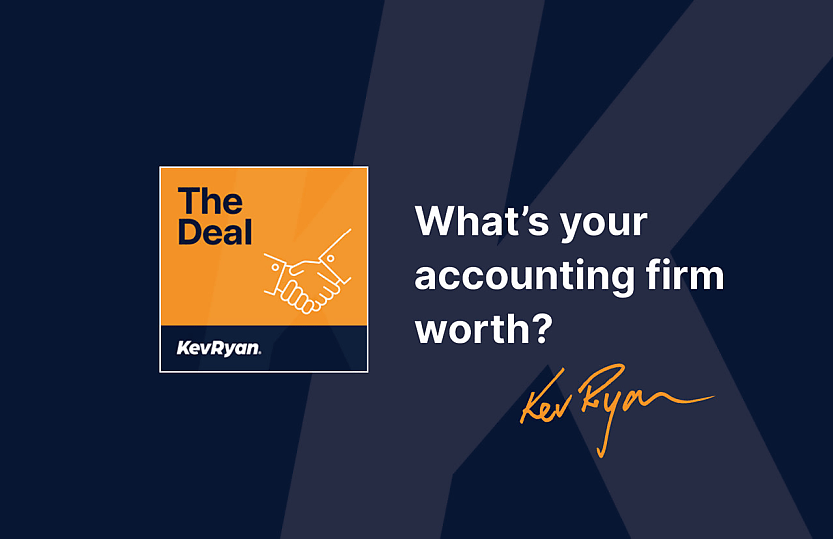Asking price: What’s your accounting business worth?

By building value into other businesses, accountants create value in their own. Transaction advisor Kev Ryan explains how to calculate what your firm is worth.
The sale of an accounting firm can seem a daunting task, with many assuming the negotiation of the price will provide the greatest single challenge.
But seasoned transaction advisor for accounting mergers and acquisitions Kev Ryan says the establishment of fair market value is often one of the least complex aspects of the process.
The greatest challenge instead comes from ensuring a perfect operational and cultural fit between buyer and seller, or between two businesses looking to merge or form some type of joint venture. That’s where a transaction advisor shows their true value.
“If you’re an accountant thinking about buying or selling, the value of the firm is actually fairly clear cut,” Ryan says. “But the success of the sale relies on a lot more than the dollar figure.”
“It’s not difficult to properly value your accounting firm. The real magic is in ensuring a seamless transaction and transition for owners, staff and clients.”
How to value your accounting firm
In accounting businesses with annual revenues below $1.2 million, the valuation method is surprisingly straightforward.
“The market has already set the value,” Ryan says. “For smaller firms, it’s usually a dollar-for-dollar calculation based on revenue.”
And so, if your firm made $600,000 last year, he explains, its valuation would typically be the same – $600,000 at sale. Revenue equals value. Simple.
Of course, although the market currently agrees on this dollar-for-dollar yardstick for smaller accounting businesses, there is sometimes more involved.
A valuation might be slightly different from last year’s revenue if the target business has seen revenues fluctuate dramatically over the previous several years. In that case, the value might instead be an average of the last three to five years.
Additionally, if the firm offers something unique, such as a strong industry niche or exclusive representation of clients in a geographic region with fewer accounting businesses, the value might see a lift.
“If the firm has shown steady growth, very strong client relationships and engagement or highly innovative technological infrastructure, the price may be driven up,” Ryan says. “But generally, that dollar-for-dollar measure provides the starting point and often the ending point.”
What a business with higher revenue worth?
What about businesses with higher revenue? Ryan says once earnings surpass $1.2 million to $1.5 million, the firm’s valuation is based on EBITDA, or net profit after tax.
In this case, the price range can be significant, from three to seven times EBITDA. The reasons for the range are also wide and varied, and often complex.
So, if valuation is that simple at the smaller end of town, is a transaction advisor necessary at all?
“An adviser takes a lot of the complexity out of the equation by ensuring a good match with interested, motivated buyers,” Ryan says.
“The cultural and professional match can add value to the transaction in so many ways, including in the early days of the sale process, during the sale itself, and during the integration process once the deal is done.”
Why culture and systems matter
“When someone buys an accounting firm, they’re not just buying a list of clients,” Ryan says. “They’re buying into the way the business operates, including the technology, the processes, and the relationships.”
The closer a cultural and technological match between two businesses, the more seamless the integration of the two. And so, while an exact match – such as the use of the same cloud-based systems – is not necessary, every little bit helps.
Perhaps most important is cultural fit. The wrong way of doing business, a clash of brand, tone or style, can result in the loss of staff and/or clients. And no buyer wants that.
“How does the business present itself?” Ryan asks “Is it formal, conservative, and suit-and-tie, or is it more casual, with a dynamic, forward-thinking approach?”
A great transaction advisor, Ryan says, develops a deep understanding of both the buyer’s and seller’s culture to make a harmonious match that ensures smooth and successful integration.
“Everyone wants the best price,” he says. “But in reality, a successful sale comes down to much more than the dollar amount. It’s about finding the right buyer, one who won’t disrupt your clients and who will preserve your business’s reputation.”
When they work with a skilled transaction advisor, Ryan says, business owners not only avoid common and sometimes costly pitfalls. They achieve financial success and the security of knowing the legacy of the business they built is in good hands.
